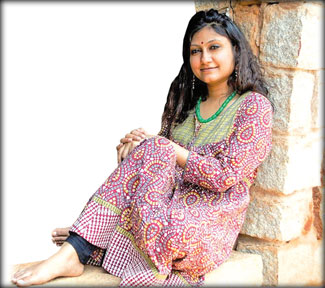Minakshi’s poetic epistle on love
By Dilshan Boange
[Part 1]
A soul devoted to the arts of melodious rhythm and textual expression
is what I feel can best capture the image and essence of Minakshi
Thakur. A poet who possesses talents and credentials of a trained
classical singer she has now made her debut as a novelist with Lovers
like You and I which was published recently. A bilingual fluent in Hindi
and English, her first book was An Indian Evening, a collection of poems
in English, published by Writers Workshop in 2002. Two collections of
Hindi poems: Jab Utthi Yavanika (When the Curtains Rose) in 2003 and in
2010, Neend Ka Akhiri Pul (The Last Bridge of Sleep), followed; the
latter being shortlisted for India’s ‘Sahitya Akademi Young Writers’
Prize, 2011.
 |
|
Minakshi Thakur |
It is surely Minakshi’s love for literature that has made her become
a professional in the publishing industry. She is currently a senior
commissioning editor with Harper Collins Publishers India. And as this
talented New Delhi based writer now embarks on a new phase in her
journey, she spoke to the Sunday Observer’s Montage about what shaped
her initial steps along the path she now journeys on, her first novel,
and what she sees taking form on her path in the days ahead. The first
instalment of this two part interview gives insights about the formative
factors that blossomed the novelist Minakshi Thakur.
Excerpts:
Q: Being born in the UK and brought up in India, how would you
define the cultural influences that shaped your outlooks?
Passion for singing
A: I grew up in India. I remembered very little of England
until I went back three years ago. I grew up in Patna in Bihar and the
culture there has shaped my outlook.
Q: Before going into your work as a writer, I’d like to ask
you about your passion for singing. What made you get trained in Khayal
and Dhrupad? Have your passions for singing had a bearing on your
writing?
A: I started learning music at the age of seven. There is a
culture of music in my family. My paternal grandfather used to sing; my
father, even though he is a doctor, sings quite well. I have aunts in
the family who sing while they are cooking or going about other
household chores.
Dhrupad was an unexpected bonus. The third guru I learnt from is from
the Bihar School of Dhrupad, the Mallick Gharana. Music was the one
great influence in the early part of my life. It has a bearing on the
way I think, the way I write, the way I look at life. The infinite
nature of the universe of music is a lesson in patience and humility. My
years of training in Hindustani classical taught me how small I was, and
yet how much I could learn or do, and how it was important to look for a
voice of your own.
Q: Your first publications were poetry. Can you tell us what
is at the heart of your poetry? What inspired them?
A: All poetry sprouts from the search for self. Most of my
writing talks about the conception of poetry. Also, the
extraordinariness of the everyday world around us dazzled me and
inspired me to write poetry.
Q: As a poet you are a Hindi-English bilingual. Your published
poetry is testimony to that. Does that also apply to your practice as a
prose writer? How did you find yourself steered to becoming a novelist?
Poetry
 A: I wrote the first draft of this novel almost nine years
ago. I started it with a poem; the poem then decided it wanted to be
someone bigger and prosaic. And poems don’t listen to you, they come
when they like, they choose how they want to grow and what they want to
become. A: I wrote the first draft of this novel almost nine years
ago. I started it with a poem; the poem then decided it wanted to be
someone bigger and prosaic. And poems don’t listen to you, they come
when they like, they choose how they want to grow and what they want to
become.
As for writing poetry in both languages, I think this novel was the
next natural step from there. This novel is intrinsically bilingual, as
you will see when you read it.
I wrote some short stories and a novella in Hindi much before I
started writing this novel.
I love the language. If someday a story wants to be told in Hindi, I
will write it in Hindi.
Novelist
Q: You have debuted as a novelist with Lovers like You and I.
As a writer do you see the genre of the novel as your calling?
A: I have begun work on my next novel. This started as a novel
and not a poem so I know it will be either be a novel or nothing. It’s
about the life of a photographer, his loves, and how like in
photography, our gaze and our perception makes our image of the world
what it is. That even though there is an absolute, pure truth, the world
as it is, it will remain forever elusive, because what’s right for you
may be wrong for someone.
But I don’t juggle things too well. My job involves working with
writers, reading, editing, evaluating other people’s novels and stories,
and it’s difficult to switch off; there is little space or time to write
a novel that’s your ‘own’; because you are filled with stories you read
at work. Given the time and focus I have, I write poems, in cabs on my
way to work or back, on weekends and otherwise. Prose requires more
time, thought and discipline. |

